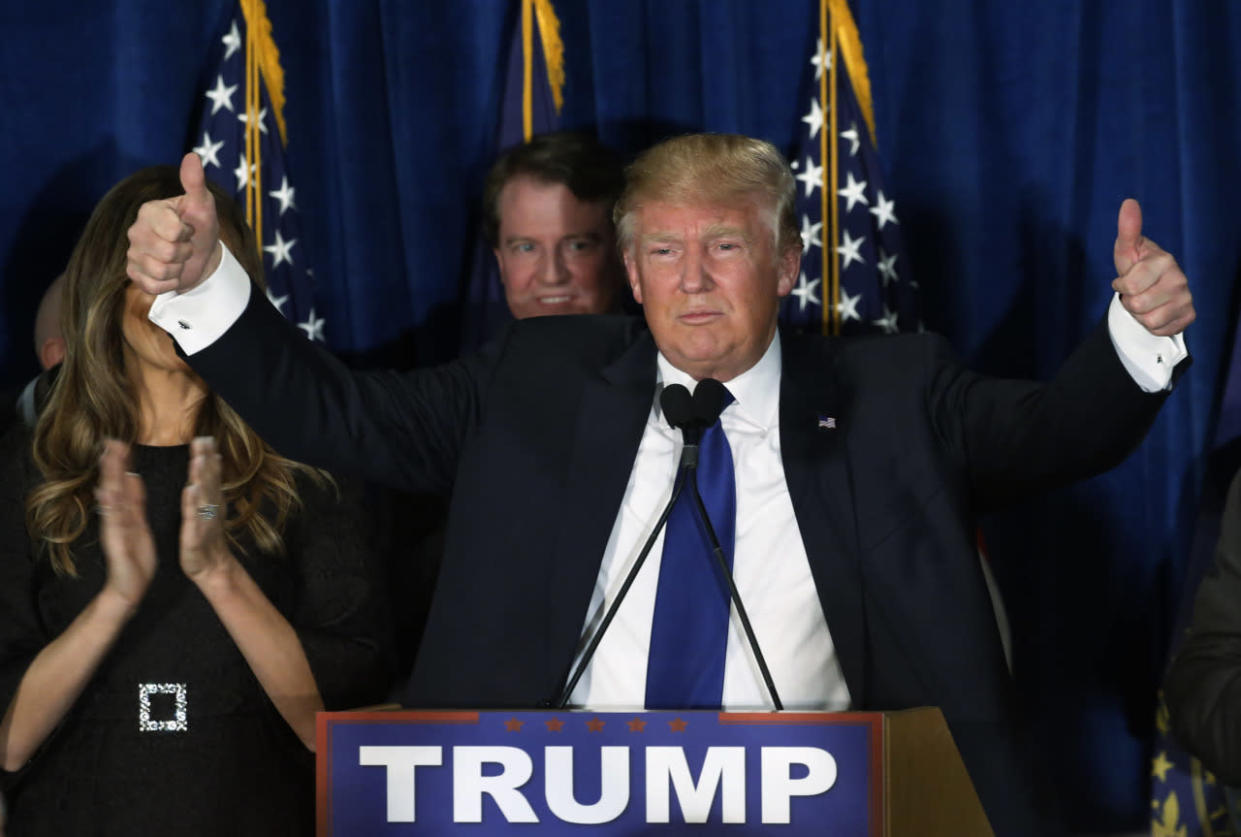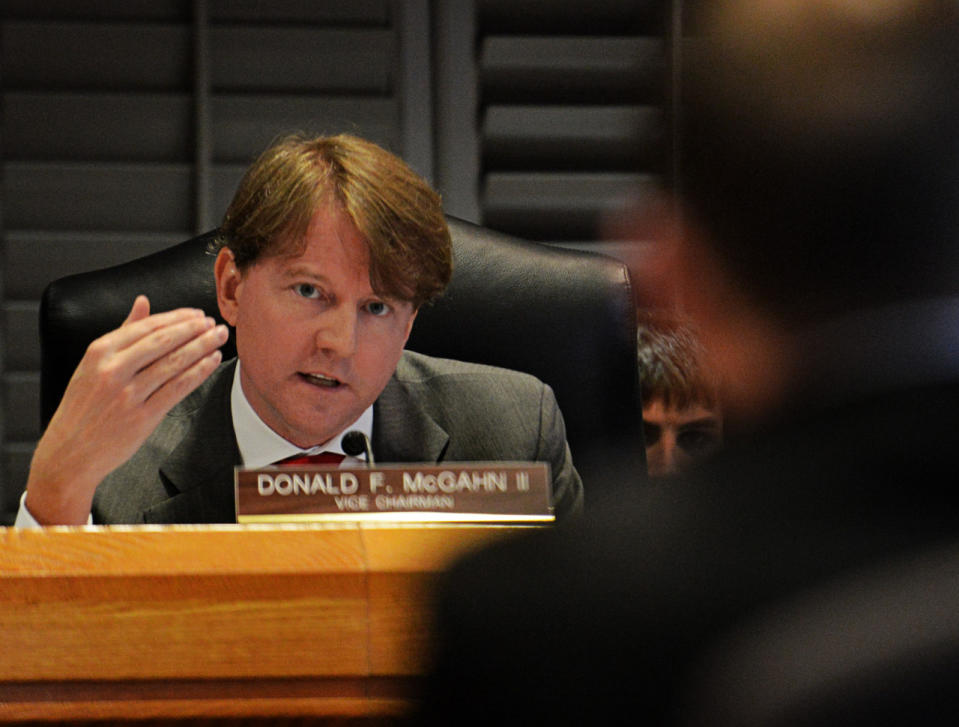One law firm, two sets of clients: Donald Trump, and the refugees he wants to deport

Donald McGahn stands behind Donald Trump in Manchester, N.H., on Feb. 9, 2016. (Photo: Jim Bourg/Reuters)
While Donald Trump publicly calls for mass deportations of all undocumented immigrants, his presidential campaign has hired a law firm that is fighting against the deportation of thousands of undocumented refugees from Central America.
After launching his campaign last year, Trump hired as his chief campaign counsel Donald F. McGahn, a former Republican chairman of the Federal Election Commission and now a partner in the Washington office of Jones Day, one of the country’s largest law firms, with more than 2,000 lawyers around the world. According to the most recent filings, Trump has paid Jones Day $598,109 for its work so far, which included defeating a legal challenge that sought to keep him off the ballot in the New Hampshire primary.
At the same time it has been billing the Trump campaign, Jones Day has been actively recruiting its partners and associates to provide free legal services to one category of the population that Trump wants to deport: the more than 100,000 people, mostly from El Salvador, Guatemala and Honduras, who have entered the country unlawfully in the past few years and then sought asylum on the grounds that they were fleeing gang violence and other persecution in their home countries.
“Over 150 lawyers from almost every U.S. office, and some international offices, are involved in this extraordinary team effort,” Jones Day proclaims on the pro bono section of its website, alongside a series of videos highlighting the firm’s work. “Currently our lawyers are representing individual mothers with children and unaccompanied children in cases in immigration courts and state courts throughout the country.”
It is hardly uncommon for big law firms to take on pro bono work for clients who might be politically unpopular; for years, major U.S. law firms were criticized by conservatives — including some officials in the Bush administration — for providing pro bono legal services to Guantanamo detainees. And there is nothing unethical about lawyers in the same firm representing clients who have different political agendas.
But the scale of Jones Day’s work on behalf of Central American asylum seekers (earning the firm a pro bono award from the American Bar Association) has struck some political consultants as potentially embarrassing for Trump — even while it has reportedly sparked tensions within the ranks of the white-shoe law firm.
“I find it highly amusing and somewhat heartening to know that Donald Trump is indirectly subsidizing the defense of undocumented immigrants through Jones Day,” said Liz Mair, a Republican consultant who founded a super-PAC, Make America Awesome, that was trying to stop Trump’s candidacy. “I can only imagine what the partners meetings are like.”

Federal Election Commission Vice Chair Donald McGahn questions a witness. (Photo: Bill O'Leary/The Washington Post via Getty Images)
Jones Day — whose alumni include the late Supreme Court Justice Antonin Scalia and Fox News commentator Megyn Kelly — has been a prominent player in Republican politics for years. It scored a coup in 2014 when McGahn and two other partners joined its “government regulation practice” from the Washington firm of Patton Boggs. McGahn was joined by Benjamin Ginsberg, who had been Mitt Romney’s national counsel in 2008 and 2012 and is now a commentator on Republican politics for MSNBC.
The firm was founded in the 1800s in Cleveland and still retains a major civic presence in the city, which will host the Republican National Convention in July. Another Jones Day partner, Chris Kelly, is co-chair of the city’s host committee for the convention.
A Jones Day spokesman did not respond to a request for comment — and two senior partners reached by Yahoo News declined to say anything, on or off the record, about the firm’s work for Trump. But after McGahn hosted a meeting at Jones Day’s offices near Capitol Hill last March between Trump and top Republican leaders, some firm lawyers were appalled and raised questions about the high-profile client at one firm meeting, according to a recent report by David Lat, who writes the Above the Law legal blog.
“It’s disgusting,” wrote one (anonymous) Jones Day lawyer in an email to Lat that he republished on his site. “I am genuinely disturbed that Jones Day accepted Trump as a client, and I would expect and hope that many other JD clients (particularly pro bono clients) would be equally disturbed. A lot of other lawyers here feel as strongly as I do.”
Although targeting unlawful immigrants has been a central plank of Trump’s campaign, the candidate has said relatively little about the continuing flood of Central American refugees who have crossed the southwest border, many of whom are now being held in detention centers in Texas while their legal claims of asylum are pending in Homeland Security immigration proceedings. But Trump has made clear he would go beyond the Obama administration’s current efforts to keep them out and deport them. He has advocated bypassing immigration courts and other legal process to expel any and all illegal immigrants. “They say you have to go through a huge legal process,” he told Business Insider last November. “You don’t. They’re illegal. If somebody walks in, they don’t bring them to court, they send them back.”
One of the few campaign papers Trump has released, called Immigration Reform That Will Make America Great Again, goes beyond building a wall across the Mexican border and tripling the number of Immigration and Customs Enforcement agents to apprehend illegal aliens; it includes a separate section on tightening the process on asylum seekers. “Increase standards for the admission of refugees and asylum-seekers to crack down on abuses,” it reads.
In a video produced by Jones Day, a partner in the Miami office, Pedro A. Jimenez, describes the plight of some of those refugees and asylum-seekers: the “children that are facing the prospect of either joining a gang or being killed” if they are returned to their home countries.


